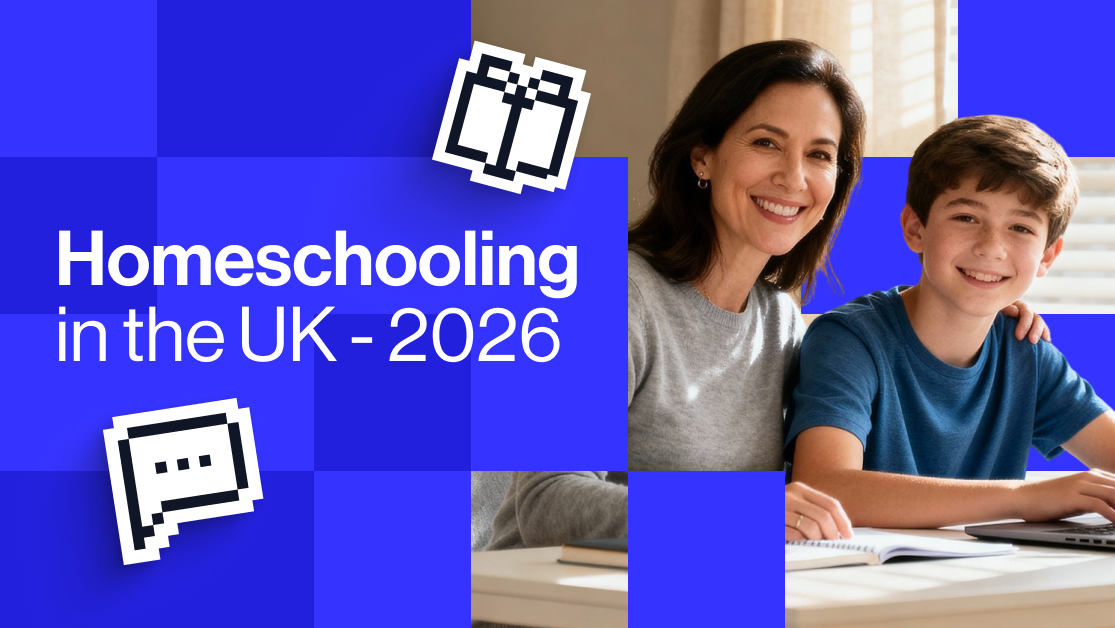
The ultimate guide to homeschooling in the UK - 2026
In the UK, parents have the legal right to provide an education that is suitable for their child’s age, ability, and any special educational needs, as outlined in the Education Act 1996.
Homeschooling, also known as ‘elective home education’ (EHE), is when parents or guardians use that right to choose to educate their children at home rather than sending them to a traditional school.
At the most recent count almost 112,000 UK children were being educated at home, a 21.4% increase on the year before.
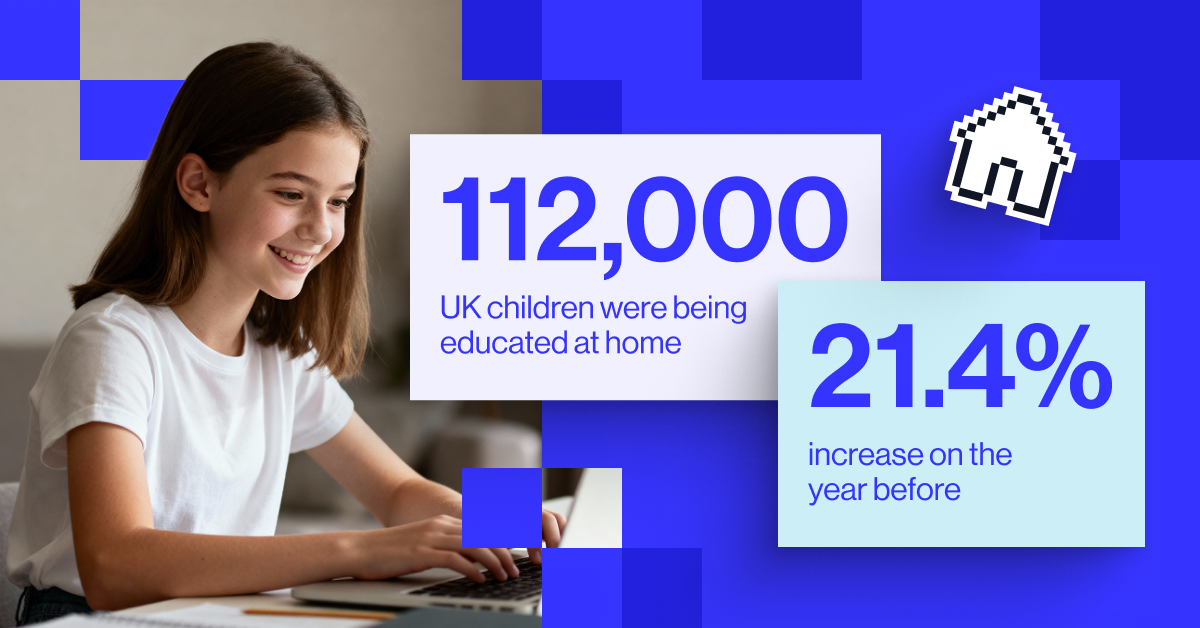
The rise was attributed to a mix of rising concerns about the quality of state education and private school costs. Increased flexibility in family life and the freedom to choose what to focus on, and how to teach it are also big draws for families across the UK.
If you’re considering home education, this guide will cover everything you need to know from how to get started and the legal requirements, through to practical advice on how to ensure your children are getting everything they can from the experience.
The benefits of homeschooling
Homeschooling comes with both pros and cons.
Let’s start with the benefits, before looking at the challenges and how to overcome them…
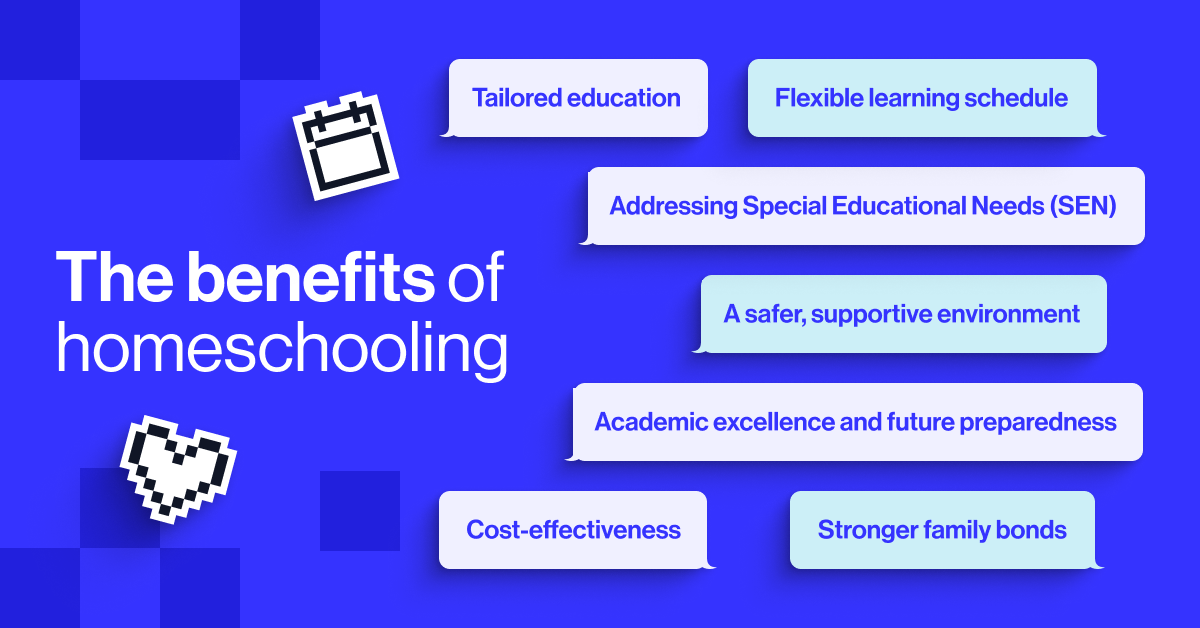
Tailored education
Educating their children at home allows parents to adapt the curriculum, teaching methods, and pace of learning to suit their child’s individual learning style and needs.
Parents can integrate subjects their child is naturally curious about, while also focussing more on areas which need a little more attention, without needing to move on to the next thing before they’re ready.
Homeschooling also allows parents to spend some time working on important life skills like critical thinking skills, financial literacy, planning, time management, cooking and cleaning.
Flexible learning schedule
Homeschooled students are not bound by traditional school hours, timetables or term times.
This flexibility can allow for more travelling and trips which allow for more real-world experiences and historical and cultural exploration, including galleries, museums and sports.
Parents can also benefit from a more flexible work-life balance, which can more easily accommodate alternative working patterns, medical appointments, life-admin and unforeseen circumstances
A safer, supportive environment
Every child is different and for those who don’t excel in a traditional classroom environment surrounded by their peers, homeschooling can provide a safer, comfier, lower stress and more supportive setting in which to learn.
Additionally, the smaller numbers of people learning in one place, allows for a greater focus - both academic and wellbeing - to be given to each individual.
Stronger family bonds
Homeschooling offers families more time together, strengthening relationships and helping to foster meaningful connections.
By working with them each day, parents also gain a deeper understanding of their child’s needs, learning styles, and aspirations.
Addressing Special Educational Needs (SEN)
Homeschooling provides an excellent opportunity for children with SEN or specific learning differences, as it allows for personalised support free from classroom distractions, expectations and assessments.
Cost-effectiveness
Homeschooling is significantly more affordable than private education.
While private tutors remain expensive, families can still access top-quality teaching, materials and support from online tools like MyEdSpace.
Academic excellence and future preparedness
Studies suggest that, thanks to the benefits outlined above, homeschooled students often perform well academically, with many achieving excellent results in their 11+, SATs, GCSEs and A-levels.
The challenges of homeschooling and how to overcome them
While homeschooling offers many benefits, it’s not without its challenges.
Here, we address the most common challenges and some practical ways to overcome them.
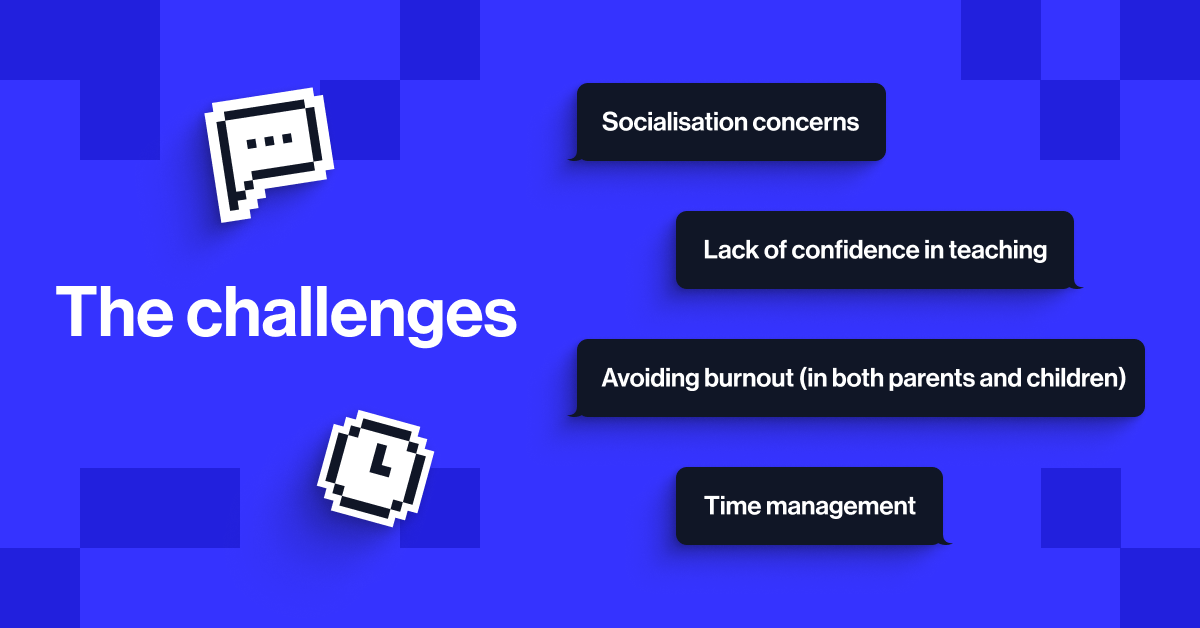
Socialisation concerns
By keeping children out of schools, parents can be concerned their children’s opportunities to interact with their peers will be limited, in turn harming their ability to develop vital social skills and build long-term friendships.
Traditional classrooms are not the only option for socialisation however, and by encouraging extracurricular activities such as joining sports teams, drama groups, or other community activities, parents can ensure their children have regular interaction with a mix of people. Arranging play dates with friends, or just heading to the local park are also great ways to widen friendship groups.
Another good option is undertaking voluntary work with your child, which not only introduces them to people of all ages and backgrounds, but also helps build their social awareness.
Finally, there are also a variety of homeschooling groups around the UK who organise in-person events, providing socialisation opportunities and support for both you and your children.
Time management
Balancing homeschooling with work, household responsibilities, life-admin and finding time to relax and recharge can be difficult.
Establishing a structured routine - with flexibility built-in - will be vital in helping you find the right balance. Be careful to set realistic daily and weekly schedules of lessons, activities and breaks.
Where possible, incorporate independent learning and involve your children in age-appropriate chores to help ease your workload, while also teaching them responsibilities and life-skills.
Finally, don’t be afraid to get help. Online learning tools - like MyEdSpace - can provide top-quality teaching, bespoke resources and educational support for a fraction of the cost of private tutors.
Lack of confidence in teaching
Many parents feel unqualified to teach certain subjects, particularly as students reach GCSE and A-levels. While this lack of confidence is understandable, you’re not alone.
One solution is to make the most of free resources online, with things like BBC Bitesize or apps like Quizlet and Duolingo.
As with time management, online tools such as MyEdSpace, can provide invaluable - expert - support. Not only are our teachers fully-qualified and highly-experienced, they also boost examination experience, meaning they know exactly what markers will be looking for, ensuring your child is all-set to score top grades when those all-important exams come around.
Avoiding burnout (in both parents and children)
Homeschooling can sometimes feel like hard work - for both parents and children - and if unaddressed, can lead to burnout.
Regular breaks, including full days off, are an essential part of effective learning, helping avoid fatigue, and also aiding retention.
Mixing up the types of activities is also a useful way to keep everyone feeling fresh and motivated. Combine online learning with hands-on activities and real-world experiences.
Three common homeschooling myths (and the reality)
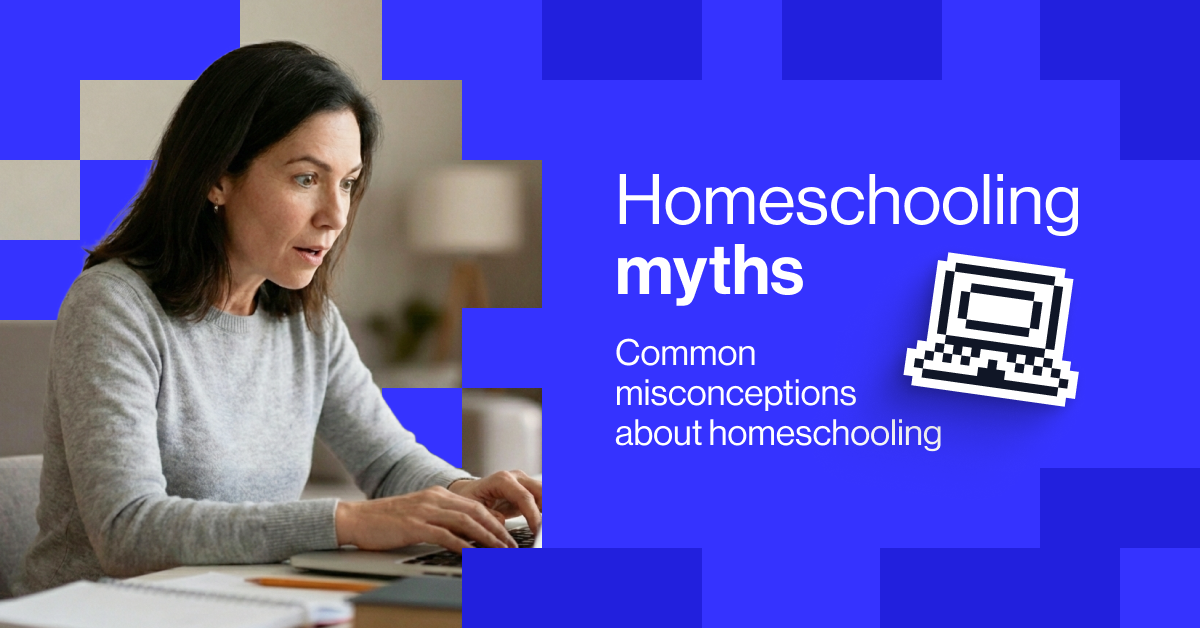
Despite its growing popularity, several misconceptions about homeschooling persist:
-
“Homeschooled children lack social skills”
Reality: Homeschooled children often participate in local groups, sports teams, and extracurricular activities where they can develop strong social skills.
-
“Parents need to be qualified teachers to homeschool”
Reality: There is no requirement for parents to hold teaching qualifications. Many use online learning platforms, tutors, and community resources for support and to ensure their children are picking up the skills and information they need.
-
“Homeschooling is isolating for families”
Reality: Homeschooling communities, online networks, and co-op groups allow families to come together and connect with each other.
How to get started with homeschooling: A step-by-step guide
Starting your homeschooling journey can seem overwhelming, but breaking it into manageable steps makes the process much simpler.
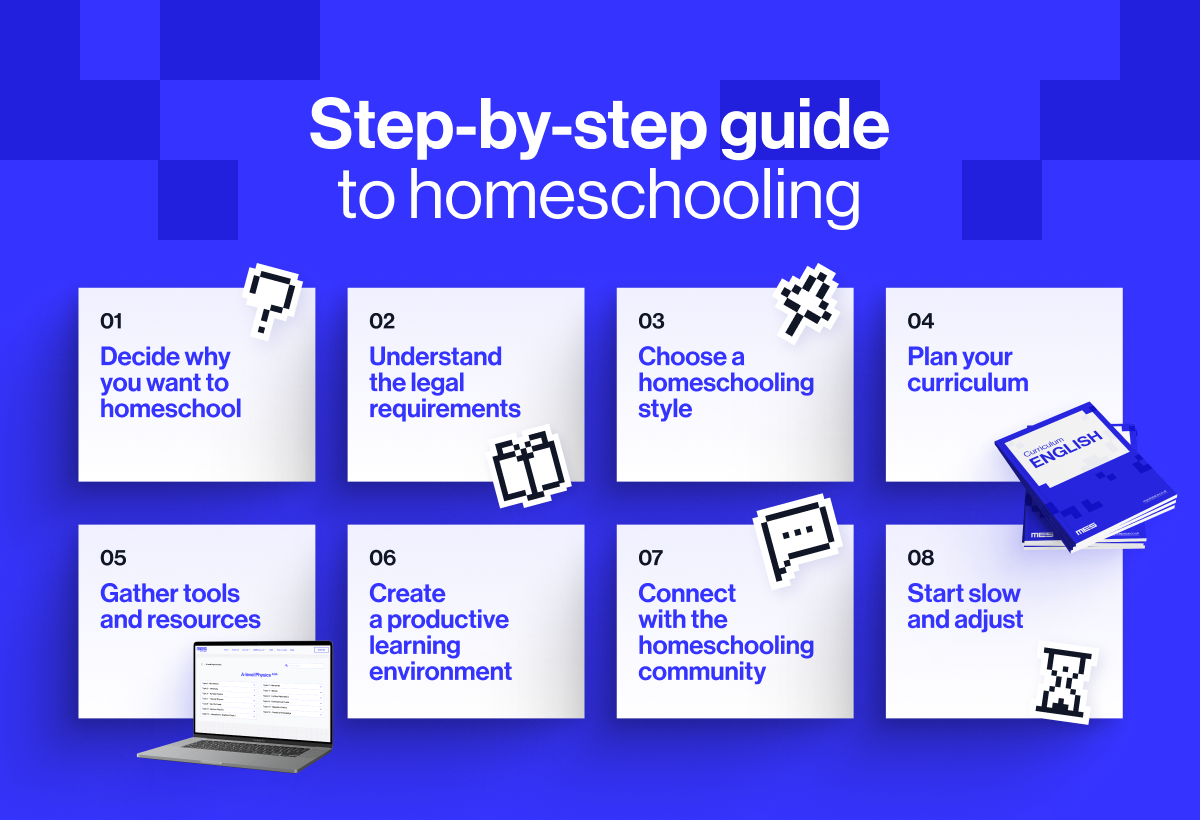
Following these steps will help you get started confidently and effectively.
Step 1: Decide why you want to homeschool
Before you begin, it’s useful to be clear about your reasons for homeschooling:
-
Are you dissatisfied with traditional education?
-
Do you want to provide a personalised curriculum?
-
Is your child’s wellbeing a concern, or do they need more individual support?
Having clear goals will help shape your homeschooling approach and keep you motivated throughout the journey.
Step 2: Understand the legal requirements
Once you know why you’re doing it, it’s worth considering the legal steps you need to take.
Homeschooling is a legal and valid alternative to school in the UK, and you do not need to follow the National Curriculum or have any teaching qualifications to homeschool your child.
However, parents are responsible for ensuring their child receives a “full-time education suitable to their age, ability, aptitude, and any special educational needs”.
Deregistering your child from school
If your child is already enrolled in a school, you must write a formal letter to the headteacher informing them of your intention to withdraw your child for home education. The school is required to inform the local authority but cannot refuse your request.
Note: If your child attends a special school due to an Education, Health, and Care Plan (EHCP), you will need the local authority’s consent before deregistering.
Notifying the Local Authority
If your child has never attended school, there is no legal obligation to inform the local authority that you are homeschooling. However, it is recommended to do so voluntarily, as some authorities like to maintain a record of homeschooled children for support and monitoring.
Local authorities may contact you to ensure that your child is receiving an adequate education. This typically involves sending a letter or requesting information about your homeschooling approach, and offering a meeting to discuss your child’s education (this is optional and you can provide written evidence instead).
Local authorities cannot insist on home visits unless there are safeguarding concerns and they cannot force you to follow the National Curriculum.
However if your child has special educational needs, local authorities may review your plans, particularly if an EHCP is in place.
Step 3: Choose a homeschooling style
There’s no “one-size-fits-all” approach to homeschooling, so you can choose a style that suits your child’s needs and your family’s goals:
-
Structured: A traditional school-at-home approach with timetabled lessons
-
Unschooling: Child-led learning based on their interests and natural curiosity
-
Online learning: Using digital platforms like MyEdSpace to provide structured lessons from expert-teachers and subject-specific support
-
Eclectic: A mix of methods combining structured and online learning with flexible, project-based activities
Step 4: Plan your curriculum
While homeschooling does not require you to follow the National Curriculum, it can provide a useful foundation, particularly if your child plans to take GCSEs or A-levels.
-
Core subjects: Prioritise English, Maths, and Science
-
Additional subjects: Include History, Geography, Arts, Coding, and Languages
-
Life skills: Incorporate skills like cooking, budgeting, and critical thinking
This is another area where the specialist support of MyEdSpace can be invaluable, offering curriculum-aligned, interactive learning resources tailored for students aged 9 and up.
Step 5: Gather resources and tools
Next, take some time to assemble a batch of resources that will help you support your child’s learning. Examples of what you’ll likely benefit from include:
-
Books and workbooks
-
Free educational apps and websites
-
Online learning platforms
-
An idea of local museums, galleries and places to visit
Step 6: Create a productive learning environment
Set up a dedicated learning space that encourages focus and creativity:
-
Keep it simple: A desk, a quiet corner, and good lighting
-
Stock up on essentials: Books, stationery, and digital devices
-
Stay organised: Use folders, schedules, and digital planners to track progress
Step 7: Connect with the homeschooling community
Find other homeschooling families and groups. Connecting with a community will provide invaluable support for you and your child.
-
Join local homeschooling groups and co-operatives
-
Attend workshops, events, or online meet-ups
-
Engage in extracurricular activities such as sports, music, and clubs
Step 8: Start slow and adjust
Begin with a light schedule and then build it up slowly to see what works best for your family. Remember:
-
Flexibility is key - adapt the routine and methods based on your child’s progress and feedback
-
Don’t stress about perfection; homeschooling is about creating a positive and effective learning environment
Real-life success stories of homeschooled children
For parents like Krista - a qualified primary teacher - and her husband - who teaches secondary music, homeschooling just made sense.
However, even with two parents who teach, there came a point where they hit a wall, especially in one area. “When he got to about Year 8, I started struggling," admits Krista. So, they turned to MyEdSpace for homeschooling help.
A-level success with MyEdSpace
Kautilya Katariya, a 10-year-old Maths prodigy from Northampton, earned an A* in A-level Maths while studying with MyEdSpace.
Guided by his tutor, Neil Trivedi, Kautilya excelled in practice tests, consistently achieving top grades. MyEdSpace is proud to support families like Kautilya's in unlocking young talent.
